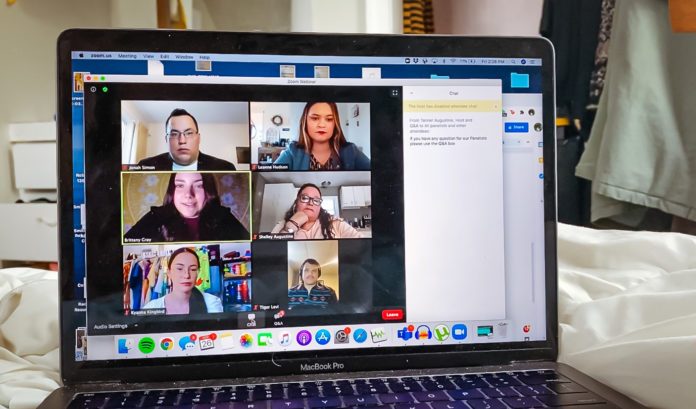

The Indigenous Student Reconciliation Committee met for a panel last Friday to speak about what reconciliation looks like at St. Thomas University.
It was the third-part of their four-part series on Indigenous education and awareness. Tanner Augustine, second-year student, hosted the panel of six current STU students and graduate speakers.
Shelley Augustine graduated from STU in 2018. She said she experienced a lot of struggles during her time as a student.
“My first language is Mi’kmaq and I’m proud to say that,” she said.
But some professors refused to meet Augustine half-way. Even after doing extra work for class, she said the professor still failed her.
Augustine said professors need to have certain accommodations to meet the needs for students, and if they do, the students will succeed.
Leanne Hudson, a current member of the Indigenous Student Reconciliation Committee, said people need to hear from Indigenous students who face systems that don’t work for them.
Her recommendation for STU and for any institution is to not rely on the Indigenous courses to guide all education.
“I would really like to see some of this cultural content appearing in settings where we are not expecting it,” she said. “I think it should be appearing in our English classrooms and our history classroom [and] in our science labs.”
Kyanna Kingston, a STU graduate from 2018, shared the third part of the 63rd call to action from the Truth and Reconciliation Commission of Canada. The part calls upon the Council of Ministers of Education in Canada to commit to Indigenous education by “building student capacity for intercultural understanding, empathy and mutual respect.”
In one class, Kingston’s professor phrased the White Paper, which attempted to eliminate treaties and assimilated Indigenous Peoples fully into Canada, as something positive.
“That’s not something you should have to teach your teachers about a topic that they are teaching,” said Kingston.
Brittany Gray, is a fifth-year STU student and founder of Project AIR, an initiative to educate fellow Indigenous students on topics like holistic wellness and ceremony. In the future, Gray wants to open the doors to non-Indigenous students.
Cultural sensitivity training for professors would help the constant interaction between students and professors, said Gray.
“If those people aren’t educated about our background there is no understanding, no empathy and no respect,” said Gray.
Tiger Levi, the Indigenous representative for STU Students’ Union, thinks there should be campaigns on racist terminology used in classrooms.
As for decolonization, he said people can’t keep treating the Indigenous population like a neglected child.
“We are not a child of the Crown,” he said. “We are our own sovereign nations.”
Hudson reiterated the need for action. She said reconciliation is a process of decolonization.
People are taught English and French while on Mi’kmaq and Wolastoqey territory, Hudson said. She also asked why Indigenous Peoples aren’t seen in positions of authority and that Indigenous Peoples need to be encouraged to step into places they’re not supposed to step into.
Those in positions of power need to listen the most, Hudson said.
“We step into these roles, we try to help, we get shut down, we get discouraged and then you expect us to keep coming back to that table,” she said.
Gray wants STU to have a better relationship with St. Mary’s First Nation. She thinks that students who are separated from their community and culture might not know who to turn to. She also said she wanted to see more of a connection between Indigenous Peoples in Fredericton from Pre-K to university because she thinks this would help students feel supported even if they aren’t from New Brunswick.
She said having the Wabanaki Centre is amazing, but it would be nice to see more Indigenous student support.
After acknowledging the work to come, Hudson said she wants to remember the things that are happening. For example, the Indigenous Student Reconciliation Committee recently established itself as a fully student-run committee.
“I have seen so many positive things happening in regards to repairing and reconciling and decolonizing and making a difference within our campus.”
